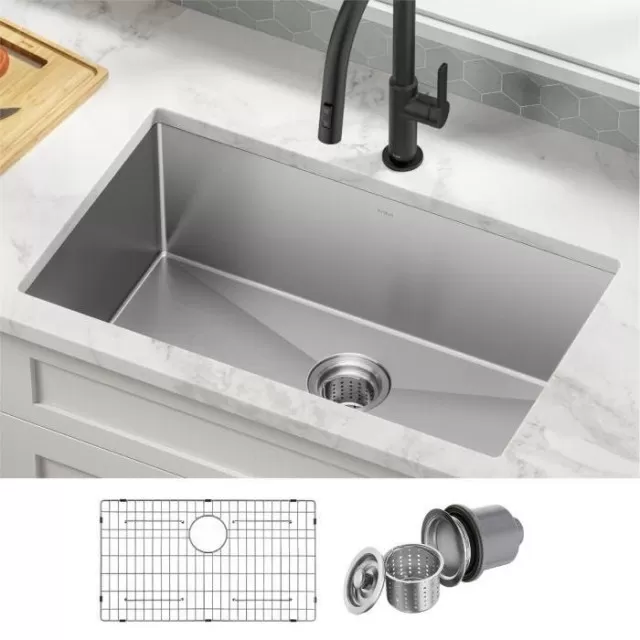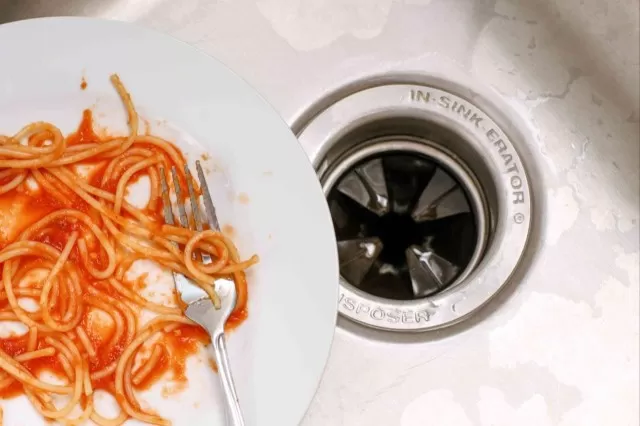Garbage Disposal Don’ts: 5 Things to Avoid Putting Down. Before disposing of anything in your garbage disposal, it’s important to exercise caution and consider the potential consequences. While a garbage disposal can handle certain food waste, it’s essential to be mindful of what you put into it to avoid clogs, damage, or malfunctions. Avoid sending hard items like bones, fruit pits, or coffee grounds, as they can damage the disposal blades.
Fibrous materials like celery, corn husks, or onion skins can also cause clogs. Grease, oils, and fats should never be poured down the disposal, as they can solidify and create blockages in the pipes. Instead, dispose of these substances in a separate container. By being selective about what you put into your garbage disposal, you can prevent costly repairs, maintain its efficiency, and extend its lifespan.
Avoiding Trouble: 15 Items to Keep Away from Your Garbage Disposal

Your garbage disposal may appear invincible, but the truth is, feeding it the wrong items can lead to unpleasant odors, blockages, and even a malfunctioning appliance.
While it may seem convenient to dispose of various items down the drain, it’s crucial to remember that the following 15 items are better suited for the trash or compost pile. To ensure the longevity and efficiency of your garbage disposal, steer clear of the following:.
Grease and Cooking Oil: These substances solidify and can clog the disposal’s blades.
Coffee Grounds: They accumulate and create stubborn blockages.
Eggshells: The membrane lining can stick to the disposal’s components, causing damage.
Pasta and Rice: These expand in water, potentially leading to clogs.
Bones: The disposal’s blades can become damaged or dulled by hard bones.
Fruit Pits: They are too hard and can harm the disposal’s blades.
Fibrous Vegetables: Stringy vegetables like celery and asparagus can tangle the blades.
Potato Peels: The starch in these peels can form a thick paste, clogging the drain.
Onion Skins: Their thin layers can wrap around the disposal’s components.
Shrimp Shells: The shells are tough and can damage the disposal’s blades.
Cornhusks: They can wrap around the blades and cause blockages.
Nuts: Their hardness can harm the disposal’s blades.
Large Seeds: Seeds from fruits like avocados and peaches are too hard for the disposal.
Non-Food Items: Keep foreign objects like bottle caps and utensils away from the disposal.
Chemicals: Harsh cleaning chemicals can damage the disposal and contaminate the environment.
By avoiding these items, you can prevent unpleasant odors, costly repairs, and the need for a replacement garbage disposal.
Remember, it’s better to be safe than sorry when it comes to your appliance’s functionality and durability.
Proper Disposal of Fat, Grease, and Oil: A Guide for Your Home
Fat, grease, and oil may seem harmless when disposed of down the drain using your garbage disposal, but they can wreak havoc on the rest of your home’s plumbing system.
To prevent clogs and costly repairs, it’s important to follow the proper disposal methods for these substances. Instead of sending them down the drain, consider the following guidelines:.
Solid Fat: When dealing with solid fat, such as leftover bacon grease or cooking oils that have solidified, it is best to dispose of them in the trash.
Allow the fat to cool and solidify completely, then scrape it into a container or wrap it in a paper towel before discarding it.
Liquid Grease and Oil: While your garbage disposal can handle small amounts of liquid or semi-solid grease and oil, it is advisable to avoid pouring them down the drain whenever possible.
Instead, collect the grease or oil in a heat-resistant container, such as an empty can or glass jar, and allow it to cool and solidify. Once solidified, seal the container and dispose of it in the trash.
By adopting these practices, you can protect your plumbing system from clogs caused by fat, grease, and oil buildup.
Proper disposal ensures that these substances do not accumulate in your pipes, leading to blockages and potential damage. Remember, it’s important to be mindful of what goes down your drains to maintain a smoothly functioning plumbing system throughout your home.
Avoid Drain Disasters: Why Pasta, Rice, and Oats Shouldn’t Go Down the Drain

Pasta, rice, and oats are undoubtedly tasty and satisfying meals, but when it comes to your plumbing system, they can spell trouble.
These seemingly harmless food items have a unique property—they continue to expand and swell with water, even after being cooked. To avoid potential clogs and plumbing issues, it’s best to dispose of them in the trash instead of sending them down the drain.
Here’s why:.
Expansion: When pasta, rice, and oats come into contact with water, they absorb it and expand in size.
This expansion can lead to blockages in your pipes, causing backups and potential damage.
Clogging: As these starchy foods absorb water and expand, they can form a sticky mass that clings to the walls of your pipes.
Over time, this buildup can obstruct the flow of water, leading to clogs and the need for costly repairs.
To prevent these plumbing nightmares, it’s advisable to discard pasta, rice, and oats in the trash.
Consider using a strainer or sieve to catch any residual grains while washing dishes, ensuring they don’t accidentally make their way into the drain.
By taking this simple precaution, you can avoid the inconvenience and expense of dealing with clogged pipes.
Remember, it’s better to err on the side of caution and toss these food items in the trash rather than risking potential plumbing disasters.
Bone Disposal: Why It\’s Safer to Keep Them Away from Your Garbage Disposal
While small bones may seem harmless, it is advisable to avoid putting any bones in your garbage disposal.
Despite the possibility of small bones passing through without issues, it’s essential to prioritize safety and protect your disposal and plumbing system. Here’s why:.
Damage to the Disposal: Bones are hard and can damage the blades or motor of your garbage disposal.
The sharp edges of bones can cause wear and tear, leading to breakdowns and the need for repairs or replacements.
Risk of Clogs: Even if bones are small enough to pass through the disposal, they can still contribute to clogs in your plumbing system.
Bone fragments can accumulate along with other debris, creating blockages that impede the smooth flow of water.
To maintain the functionality of your garbage disposal and avoid potential plumbing issues, it is best to dispose of bones in alternative ways.
Consider wrapping them in a secure bag and throwing them in the trash or, if available, using them for composting purposes.
By keeping bones away from your garbage disposal, you can prevent damage and ensure the longevity of your appliance.
Remember, it’s better to be cautious and prioritize the well-being of your disposal and plumbing system to avoid unnecessary expenses and inconvenience.
Handle with Care: Why Seafood Shells Should Stay Out of Your Garbage Disposal

When it comes to seafood shells, it’s important to exercise caution and avoid disposing of them down your garbage disposal.
Whether you’re dealing with clams, oysters, mussels, or lobsters, these hard casings can pose a risk to both your disposal and plumbing system. Here’s why:.
Potential Damage to Blades: Seafood shells are hard and can damage the blades of your garbage disposal.
The tough shells can dull or break the blades, leading to reduced performance or complete malfunction of the appliance.
Increased Risk of Clogs: Seafood shells, particularly when fragmented, can contribute to clogs in your plumbing system.
They can accumulate along with other debris, creating blockages that impede the proper flow of water and result in backups.
To ensure the smooth operation of your garbage disposal and avoid potential plumbing issues, it’s best to dispose of seafood shells in alternative ways.
Consider placing them in a sealed bag and disposing of them with your regular trash.
By keeping seafood shells away from your garbage disposal, you can safeguard the longevity and functionality of your appliance, as well as prevent clogs in your plumbing system.
Remember, it’s better to handle these shells with care and choose appropriate disposal methods to avoid unnecessary complications and repairs.
*The information is for reference only.